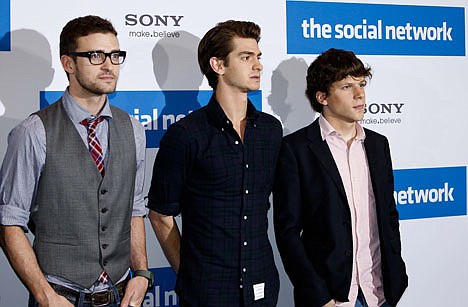Truth is hazy in gripping 'Social Network'
Computer programmer isn't the typical occupation for Hollywood's heroes and villains. All the more reason "The Social Network" goes out of its way to blur the truth about the creation of Facebook.
In what seems like an impossible feat for even the most talented filmmakers, director David Fincher ("Fight Club," "Zodiac") and "West Wing" writer extraordinaire Aaron Sorkin have crafted a thoroughly entertaining and meaningful film about something as mundane as making a website.
For all its characters, multiple perspectives and flashbacks, "The Social Network" operates on a core premise: The man who created a friend-making website isn't very good at keeping friends in real life.
The story is bookended by scenes in which Facebook founder Mark Zuckerberg (Jesse Eisenberg) copes with the repercussions of a bad breakup. Just a nerdy programming major at Harvard, Zuckerberg finds inspiration from the scathing insult of a coed (Rooney Mara, soon-to-be "The Girl with the Dragon Tattoo" for an American remake). His revenge website Facesmash eventually leads to Facebook, as well as a couple of lawsuits raised by former colleagues.
It doesn't take long before the film flashes forward to two depositions, one involving scorned business partner Eduardo Saverin (Andrew Garfield, soon-to-be "Spider-man" in a franchise reboot), and the other by the Winklevoss twins (both played by Armie Hammer through technical wizardry).
"The Social Network" then bounces back and forth in time to show the conflicting perspectives of how Facebook came to be, through theft, tricky contracts and partying with oily Napster founder Sean Parker (a terrific Justin Timberlake).
We all know the eventual outcome five minutes into the movie, but Sorkin's brisk dialogue helps to sustain momentum. It's the kind of slick, breathless language that made "The West Wing" the best show on TV when Sorkin was running it.
Are the conversations realistic? Probably not, as the real Zuckerberg likely isn't as spastic or clever as Eisenberg. The best programmers spend far too much time writing code to even think about witty retorts.
Fincher is a considerable talent behind the camera, holding the pace of a talky picture with interesting visuals and top-notch performances. Eisenberg balances his character's apparent selfishness with enough awkwardness to make it hard to truly vilify Zuckerberg's actions. Garfield, meanwhile, plays with enough pathos to make Saverin the much-needed human access point to the saga, especially playing against the robotic behavior of Zuckerberg.
The truth in "The Social Network" may or may not be present. Fincher and Sorkin seem more interested in crafting a dramatic exercise than they are the actual facts of the case.
What it does expose are the social habits of a new generation. While it's pretty common nowadays to have 500 social acquaintances on Facebook, few of us can count more than a handful of legitimate, talk-to-them-in-person friends. The final scene of "The Social Network" is a doozy, as it gives us a rare window into Zuckerberg's perspective on how his creation changed the way an entire generation now communicates.
It seems like everywhere you read "The Social Network" is being hailed as the best film of the year. I say go in with managed expectations. As entertaining as the Sorkin dialogue is, the movie's pacing feels, at times, too architectural. The drama plays out exactly as you expect it to, leaving very little for genuine surprise.
And though it sometimes feels more like a dramatic exercise than an organic story, "The Social Network" is an exercise executed to near perfection.
Grade: A-
Tyler Wilson can be reached at twilson@cdapress.com. Read more film reviews and pop culture commentary at www.NormdogEntertainment.com.

